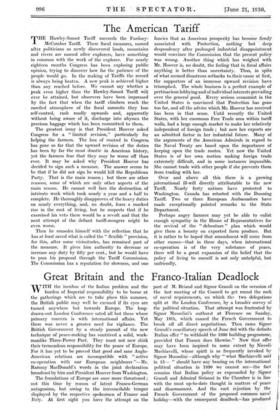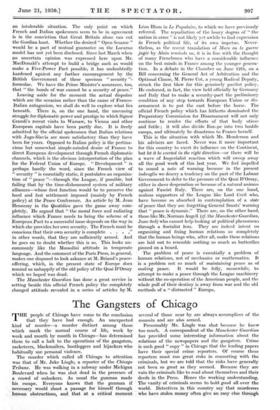Great Britain and the Franco-Italian Deadlock W ITH the incubus of
the Indian problem and the burden of Imperial responsibility to be borne at the gatherings which are to take place this summer, the British public may well be excused if its eyes are turned anywhere but towards Europe. The long- drawn-out London Conference sated all but those whose primary concern is with international affairs. Yet there was never a greater need for vigilance. The British Government by a steady pursuit of the new technique of peace-making has contrived a solid, work- manlike Three-Power Pact. They must not now shirk their tremendous responsibility for the peace of Europe. For it has yet to be proved that good and sane Anglo- American relations are incompatible with " active co-operation with our European neighbours "—Mr. Ramsay MacDonald's words in the joint declaration broadcast by him and President Hoover from Washington.
The foundations of Europe are once more threatened ; not this time by reason of latent Franco-German antagonism, but owing to the irreconcilable temper displayed by the respective spokeimen of France and Italy. At first sight you have the 'attempt. on the part of M. Briand and Signor Grandi on the occasion of the last meeting of the Council to get round the rock of naval requirements, on which the two delegations split at the London Conference, by a broader survey of the political situation. That attempt was frustrated by Signor Mussolini's outburst at Florence on Sunday, May 18th, which caused the -French Government to break off all direct negotiations. Then came Signor Grandi's conciliatory speech of June 3rd with the definite Italian offer " to withhold the 1930 building programme, provided that France does likewise." Now that offer may- have been inspired to some extent by Niccolo Machiavelli, whose spirit is so frequently invoked by Signor Mussolini—although why " what Machiavelli said in 15— " should have any bearing on the international political situation in 1930 we cannot see—the fact remains that Italian policy as expounded by Signor Graiidi and Admiral Sirianni in the Chamber is in line with the most up-to-date thought in matters of peace and disarmament. And the curt rejection. by the French Governraent of the proposed common" naval holiday-with the consequent' deadlock has produced an intolerable situation. The only point on which French and Italian spokesmen seem to be in agreement is in the conviction that Great Britain alone can cut the Gordian knot. Whether the desired " Open Sesame " would be a pact of mutual guarantee on the Locarno model has not yet been disclosed. Since last March when no uncertain opinion was expressed here upon Mr. MacDonald's attempt to build a bridge such as would make a Five-Power Pact possible, it has undoubtedly hardened against any further encouragement by the British Government of these specious " security "- formulae. We have the Prime Minister's assurance, too, that " the bonds of war cannot be a security of peace."
Leaving aside for, the moment the actual disputes which, are the occasion rather than the cause of Franco- .Italian antagonism, we shall do well to explore what lies beneath. There is, on the one hand, the unceasing struggle for diplomatic power and prestige to which Signor Grandi's recent visits to Warsaw, to Vienna and other European capitals have been partly due. It is freely admitted by the official spokesmen that Italian relations with Jugo-Slavia are more satisfactOry than they have been for years. Opposed to Italian policy is the pertina- cious but somewhat simple-minded desire of France to direct European development through French diplomatic channels, which is the obvious interpretation of the plan for the Federal Union of Europe. " Development " is perhaps hardly the word, since the French view of " security " is essentially static, it postulates an organiza- tion of " peace "—through the League, if possible, but failing that by the time-dishonoured system of military alliances—whose first function would be to preserve the hard and fast settlement imposed (mainly by French .policy) at the Peace Conference. An. article by M. Jean Hennessy in the Quotidien gave the game away com- pletely. He argued that " the moral force and radiating influence, which France needs to bring the scheme of a European Pact to a successful issue depends on the way in which she provides her own security. The French must be conscious that their own security is complete . . ," in other words, that they are sufficiently armed. And he goes on to doubt whether this is so. This looks un- commonly like the Mussolini attitude in temperate language. And the comment of the Paris Press, in general, . makes one disposed to look askance at M. Briand's peace- - offering, which, in the present state of Europe does . remind us unhappily of the old policy of the Quai D'Orsay which we hoped was dead.
The Manchester Guardian has done a great service in setting beside this official French policy the • completely changed attitude revealed in a series of articles by M. Leon Blum in Le Populaire, to which we have previously referred: The repudiation of the hoary dogma of " the nation in arms " is not likely yet awhile to find expression in French political life, of its own impetus. Never- theless, as the recent translation of Mars ou la guerre jug& by Main reminds us, it is in line with the thought of many Frenchmen who have a considerable influence on the best minds in France among the younger genera- tion. In a debate in the Chamber on June 12th, on a Bill concerning the General Act of Arbitration and the Optional Clause, M. Pierre Cot, a young Radical Deputy, struck the first blow for this genuinely pacifist policy. He endorsed, in fact, the view held officially by Germany and Italy that to make a security-pact the preliminary condition of any step towards European Union or dis- armament is to put the cart before the horse. The official French policy which has hitherto dominated the Preparatory Commission for Disarmament will not only continue to render the efforts of' that body otiose and futile ; it will also divide Eurupe into two hostile camps, and ultimately be disastrous to France herself.
This is the situation with which Mr. Henderson and his advisers are faced. Never was it more important for this country to exert its influence on the Continent, but let it be- exerted in the right direction—or there will be a wave of Imperialist reaction which will sweep away all the good 'work of this last year. We feel impelled to sound a note of warning because in the present imbroglio we descry a tendency on the part of the Labour Government to defer to the pressure of the Quai D'Orsay, either in sheer desperation or because of a natural animus against Fascist Italy. There are, on the one hand, zealous supporters of the League like Lord Cecil who, have become so absorbed in contemplation of a state of peace that they are forgetting General Smuts' warning that " peace is dynamic." There are, on the other hand, those like Mr. Norman Angell (cf. the Manchester Guardian, June 3rd) who cannot help looking at political phenomena through a Socialist lens. They are indeed intent on organizing and fixing human relations so completely that the human beings who, after all, make these relations .are laid out to resemble nothing so much as butterflies pinned on a board.
The problem of peace is essentially a problem of human relations, not of mechanics or mathematics. It is a problem not so much of maintaining peace as of making peace. It would be folly, meanwhile, to attempt to make a peace through the League machinery without the co-operation of the American people, and the whole pull of their destiny is away from war and the old methods of a " distracted " Europe.









































 Previous page
Previous page